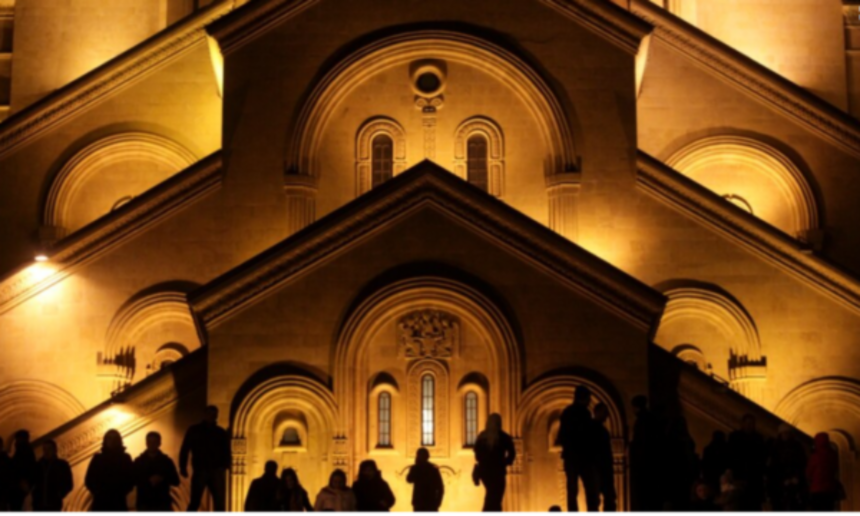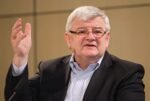Are the Orthodox churches in the Balkans part of Russia’s “invisible empire”? A strong indicator is the positioning of these churches between two poles of the Orthodox world – the Moscow Patriarchate and the Ecumenical Patriarchate based in Istanbul. This division became especially noticeable after Russia’s aggression in Ukraine in February 2022, when two churches fought for recognition. The first was the Ukrainian Orthodox Church, supported by the state, while the second was the Ukrainian Orthodox Church – Moscow Patriarchate, which was banned by the Ukrainian Parliament in August 2024 due to its actions in line with the Kremlin’s agenda.
Instead of recognizing the Ukrainian Orthodox Church as the sole state-recognized religious authority, the Serbian, Bulgarian, Macedonian, and Albanian churches have chosen to support the pro-Russian church.
The last church to recognize Russia’s religious presence in Ukraine was the Macedonian Orthodox Church – Ohrid Archbishopric. This decision was made just a month after the Ukrainian Parliament banned its operation. With this act, the Church in Skopje risks not receiving the recognition of independence from the Ecumenical Patriarchate in Istanbul, which is positioned against Russia’s religious influence. In 2019, the Ecumenical Patriarchate recognized the Ukrainian Orthodox Church, giving a blow to Russian ecclesiastical diplomacy. By entering this dispute between the two centers of Eastern Orthodoxy, the Russian Church and the Ecumenical Patriarchate, the Macedonian Church becomes a pawn in an ongoing process whose outcome is uncertain.
“With this move, the Macedonian Church directly sides with the Russian Church and opposes the Ecumenical Patriarchate,” says Nikolai Krastev, a journalist from Sofia and a well-versed geopolitical analyst. “Although it is awaiting its recognition, the Macedonian Church decided to express support for the pro-Russian Ukrainian Church, a move that raises many questions about its place in the Orthodox world. This will certainly damage the Macedonian Church’s plans to receive the long-awaited recognition from the Ecumenical Patriarchate so that it can truly become an equal church in the family of other Orthodox churches.”
Since 2017, the Macedonian Church has been in the process of receiving recognition from the Ecumenical Patriarchate in Istanbul. However, with this decision, that recognition is now at risk, and the church returns to the sphere of ecclesiastical influence of Belgrade and Moscow.
“The Macedonian Church lost its chance to side with justice in this war, which has many aspects, and the ecclesiastical element precedes it. The influence of the ‘Serb world’ in the post-Yugoslav space led to the change of governments in Montenegro and Macedonia, which gravitated (in)voluntarily towards Belgrade and from there to Moscow,” assesses Krastev.
According to him, Russian and Serbian ecclesiastical influence will grow because the Moscow and Belgrade Patriarchates are turning the Church in Skopje into a pawn on the ecclesiastical chessboard.
Marjan Nikollovski, an analyst from Skopje specializing in religious affairs in the region, tells The Geopost that the Russian Church thinks in a territorial imperialistic way.
“In this context, one of the latest statements from the Russian Patriarch – that every territory of the former Soviet Union is under the jurisdiction of the Russian Church and that it has authority over it – was quite telling. So, the Russian Church could tomorrow create an autocephalous, autonomous, and independent church but within its federative borders. This is the model of a federation of churches,” says Nikollovski.
According to him, Russia is attempting to apply this same model of a church federation in the region, where the territory of the former Yugoslavia is placed under the jurisdiction of the Serbian Orthodox Church. “The Serbian Church has already given fake recognition to the Macedonian Church. This is why it is attempting to prevent recognition from the Ecumenical Patriarchate so that the Macedonian Church remains an internal issue of the Serbian Church. Thus, it would remain an autocephalous church within the jurisdiction of the Serbian Church. According to this model of a federation of churches, we could see an Autocephalous Montenegrin Orthodox Church and even an Autocephalous Kosovar Orthodox Church, naturally within the federation of the Serbian Church,” says Nikollovski.
Analyst Krastev reminds that the Serbian and Russian churches were opposed to the independence of the Macedonian Church and for years sided with Belgrade, not Skopje. According to him, Russia’s influence on Macedonian Orthodoxy is increasing, and this is impacting its behavior in the Orthodox world.
“I wonder what the behavior of the Macedonian Church will be for resolving the Montenegrin church issue? Where the Macedonian Church is heading in this complex ecclesiastical diplomatic game is still too early to say, but the first signs suggest that its turn towards Belgrade and Moscow is the wrong direction,” emphasizes Krastev.
In the past, the Macedonian Church has not hidden its sympathies for Russia. In January of the previous year, the second-highest official of the Russian Orthodox Church, Bishop Antony, visited North Macedonia. Besides meetings, he held a joint liturgy with the Macedonian Archbishop Stefan. Also, in January 2023, a delegation of Russian church officials, accompanied by the Russian ambassador in Skopje, Sergey Bezdnikin, visited the headquarters of the Macedonian Church in Skopje.
Russia’s influence through the Orthodox Church in the Balkans is significant and cost-effective. Besides influence, ecclesiastical officials have often been caught engaging in espionage activities. In September 2023, North Macedonia expelled the Russian Church representative Vasian Zmeev due to espionage activities in the country. The same action was taken by Bulgaria, where the Russian priest Zmeev worked as the ecclesiastical representative of the Moscow Patriarchate in Sofia.







